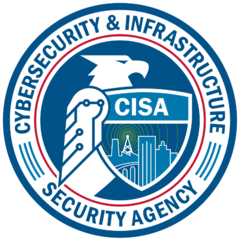Difference between revisions of "Cybersecurity and Infrastructure Security Agency"
m (t) |
m (→Astroturfing) |
||
| Line 17: | Line 17: | ||
==Astroturfing== | ==Astroturfing== | ||
| − | The [[Twitter | + | The [[Twitter Files]] revealed that in [[2017]], Pentagon officials asked Twitter to "whitelist" several accounts that the Pentagon was using to spread messages in the [[Middle East]]. |
In response, Twitter granted the account permissions similar to those reserved for verified accounts. The FBI was reported to be communicate messages from other clandestine US intelligence [[spooks]], including those of the U.S. intelligence community and the DHS’s [[Cybersecurity and Infrastructure Security Agency]], even receiving criticism from Twitter why they have [[FBI]] officials solely tasked with searching for Tweets. The DHS was announced to investigate elections in [[2017]] as a new priority battling "[[disinformation]]". | In response, Twitter granted the account permissions similar to those reserved for verified accounts. The FBI was reported to be communicate messages from other clandestine US intelligence [[spooks]], including those of the U.S. intelligence community and the DHS’s [[Cybersecurity and Infrastructure Security Agency]], even receiving criticism from Twitter why they have [[FBI]] officials solely tasked with searching for Tweets. The DHS was announced to investigate elections in [[2017]] as a new priority battling "[[disinformation]]". | ||
Latest revision as of 06:47, 8 September 2023
(Censor) | |
|---|---|
 | |
| Formation | 2018 |
| The agency that cares so much about security, it's in the name twice. | |
The Cybersecurity and Infrastructure Security Agency (CISA) is an agency of the United States Department of Homeland Security (DHS). Nominally created in 2018 to defend the United States against cybersecurity threats from hostile foreign actors (e.g., Russian hackers), it almost at once became an an explicitly inward-facing domestic censorship bureau.[1]
Official narrative
CISA is responsible for strengthening cybersecurity and infrastructure protection across all levels of government, coordinating cybersecurity programs with US states, and improving the government's cybersecurity protections against private and nation-state hackers. CISA's activities are a continuation of the National Protection and Programs Directorate (NPPD), and was established on 16 November 2018 when President Donald Trump signed into law the Cybersecurity and Infrastructure Security Agency Act of 2018.[2]
Censorship
CISA's Internet censorship power grew out of interpreting "critical infrastructure" beyond its hard physical meaning to apply to ideas and opinions. By 2019, when the narrative of "Russian interference in elections collapsed, the apparatus quietly, but entirely, pivoted to focus inward on "domestic disinformation." This meant that, henceforth, any US citizen posting what DHS considered “misinformation” online was suddenly conducting a cyber attack against US critical infrastructure.[3]
Astroturfing
The Twitter Files revealed that in 2017, Pentagon officials asked Twitter to "whitelist" several accounts that the Pentagon was using to spread messages in the Middle East. In response, Twitter granted the account permissions similar to those reserved for verified accounts. The FBI was reported to be communicate messages from other clandestine US intelligence spooks, including those of the U.S. intelligence community and the DHS’s Cybersecurity and Infrastructure Security Agency, even receiving criticism from Twitter why they have FBI officials solely tasked with searching for Tweets. The DHS was announced to investigate elections in 2017 as a new priority battling "disinformation".
In 2020, the CISA created a operational faction called the Election Integrity Partnership (EIP) and included the Stanford Internet Observatory, the University of Washington’s Center for an Informed Public, the Atlantic Council’s Digital Forensic Research Lab, and Graphika, a social media analytics firm. The EIP was superficially meant to "bypass the First Amendment for government-aligned agencies" to interfere with the government limits on combating free speech].[4][5]
At a certain point, automated programs set up with the EIP even (temporarily) banned the Twitter accounts of the New York Post and then-White House spokeswoman Kayleigh McEnany for posting the blacklisted link to the Post’s Hunter Biden laptop story.[6]
Related Quotation
| Page | Quote | Author | Date |
|---|---|---|---|
| The Twitter Files | “CISA does not censor speech, period. CISA’s mission is to build resilience to disinformation and foreign malign influence activities that threaten critical infrastructure, including election infrastructure,” a CISA spokesperson told The Epoch Times via email. “We work in a non-partisan manner with state and local election officials to equip the American public with accurate information about the conduct and security of their elections. Online content platform operators, as always, make their own decisions regarding the content on their platforms.”” | Peter Svab The Epoch Times | 17 January 2023 |
References
- ↑ https://report.foundationforfreedomonline.com/11-9-22.html
- ↑ "Trump signs bill that creates the Cybersecurity and Infrastructure Security Agency"
- ↑ https://report.foundationforfreedomonline.com/11-9-22.html
- ↑ https://www.aljazeera.com/economy/2022/12/21/twitter-secretly-boosted-us-military-propaganda-investigation
- ↑ https://nypost.com/tag/twitter-files/
- ↑ https://myvalleynews.com/blog/2023/01/22/infographic-key-revelations-of-the-twitter-files/